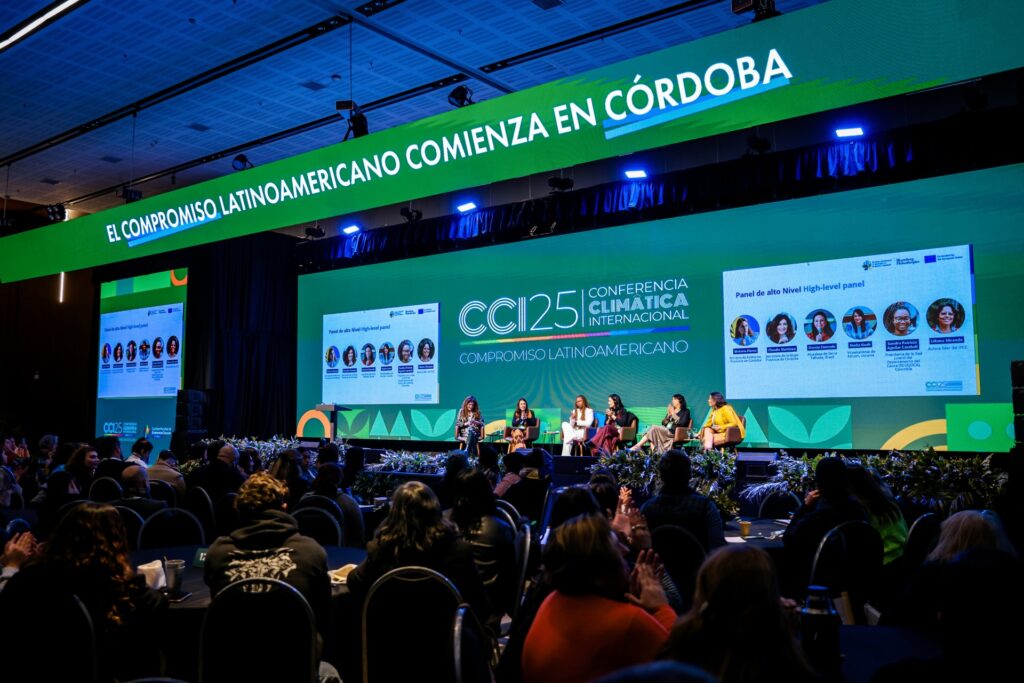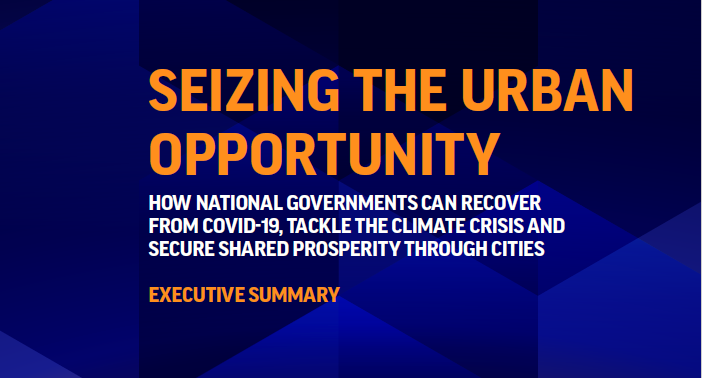Accelerating Collective Local Action in the Face of the Climate Crisis – GCoM Secretariat Newsletter, July 2025

From peer learning across continents to new finance roadmaps, technical assistance, and strategic partnerships, cities are demonstrating that solutions are already in motion – what is needed now is the scale and investment to match their ambition. This edition of the Global Covenant of Mayors for Climate & Energy (GCoM) newsletter celebrates the strength of collective local action in the face of the climate crisis, highlights how local governments are forging pathways toward a cleaner, fairer, and more resilient future, and how global collaboration is helping them turn plans into concrete action.
News from the Global Secretariat
🌐 GCoM Welcomes Teresa Ribera as New Co-Chair
GCoM proudly welcomed Teresa Ribera, Executive Vice-President of the European Commission for Clean, Just and Competitive Transition, as its newest Co-Chair. Succeeding Maroš Šefčovič, EVP Ribera brings over twenty years of exceptional leadership and knowledge in climate policy, energy transition, and sustainability. Her expertise will bolster GCoM’s efforts to empower local governments, drive resilience, and support a clean, just, and competitive transition across cities worldwide.
⚖️ Cities in the Balance Campaign
GCoM’s new ‘Cities in the Balance’ campaign is urging greater investment in city-led climate action. With cities facing escalating climate impacts that threaten lives, livelihoods, and infrastructure, the campaign calls for $800 billion in annual public investment to meet just 20% of the total urban climate finance need, unlocking wider economic, social, and environmental returns. Mayors worldwide are sharing their messages across social media, spotlighting how climate finance delivers cleaner air, green jobs, and healthier communities. The campaign invites everyone, not just mayors, to participate by creating and posting their own balance-themed images or videos using the hashtag #CitiesInTheBalance and tagging @Mayors4Climate. This is a moment when everything hangs in the balance, and it’s time to tip the scales toward a resilient urban future.
🏙️ Cities Meet Cities initiative continues to accelerate climate action
GCoM’s Cities Meet Cities initiative continues to accelerate climate action through impactful peer exchanges. In May, the Mayor of Katowice (Poland) led a delegation to Santa Fe (Argentina), where the cities shared strategies on sustainable land use, environmental education, and waste management, including a visit to initiatives supported by international cooperation with Poitiers (France). A delegation from Zapopan (Mexico) visited Dakar (Senegal) to explore flagship projects on circular economy, energy-efficient municipal buildings, and sustainable agriculture that supports women’s empowerment. In Kloto (Togo), representatives from Lurín (Peru) learned about nature-based flood prevention and early warning systems. Final cluster visits also took place: Hang Tuah Jaya (Malaysia) hosted exchanges on solar energy, smart grids, and carbon tracking; Antalya (Türkiye) focused on energy efficiency, waste reduction, and sustainable water use; and Balti (Moldova) showcased integrated planning for mobility and energy, with visits to local utilities and sustainability hubs. Each exchange demonstrated how peer learning among cities can drive more effective and inclusive climate solutions.
🤝 Local Collaboration at the CCFLA Central Asia Forum
The Cities Climate Finance Leadership Alliance (CCFLA) Central Asia Local Hub Forum, held from 18 to 19 February 2025 in Tashkent, Uzbekistan, convened cities, technical experts, and development partners to strengthen collaboration on sustainable urban development, energy efficiency, and access to climate finance in the region. The GCoM–Gap Fund Partnership supported multiple sessions focused on equipping cities with the knowledge and tools needed to prepare strong, bankable climate projects.
🏦 Bankable Cities: Advancing Finance-Ready Urban Climate Solutions
The GCoM Bankable Cities initiative assists cities in maturing project ideas to be finance-ready. Currently, cities across multiple regions are advancing project concepts to unlock climate finance for sustainable urban development. In India, Udaipur has received a refined roadmap for transitioning to electric auto-rickshaws, complete with tailored subsidy models, while Siliguri is reviewing a nature-based solution for a sponge park along the Mahananda River, designed to mitigate flooding and plastic pollution. In Ukraine, Mykolaiv has been presented with a comprehensive waste management concept, including new composting facilities, PET separation systems, and civic amenity centers. Meanwhile, Umm El-Jimmal in Jordan is progressing with plans to rehabilitate historic Roman water infrastructure and has submitted a funding proposal under the Interreg NEXT-MED call with partners from Spain, Italy, and Tunisia.
💸 Paving the way to COP30: Multilateral Development Banks Advance Plans to Scale Sustainable Investment in Cities
In late April, Multilateral Development Banks (MDBs) convened to discuss plans to scale up and improve access to climate finance for cities. The roundtable “Scaling Sustainable Investment in Cities: The Role of MDBs” marked the third in a series of meetings that go back to 2023, aimed at enhancing the role of MDBs in closing the urban climate finance gap. This gathering, convened by the C40 Cities Climate Leadership Group, the Global Covenant of Mayors for Climate and Energy (GCoM), and Bloomberg Philanthropies, represented an important milestone in efforts to bridge the gap between current levels of urban climate investment and what cities truly need.
⚙️ Advancing Climate-Resilient Infrastructure Through GCoM Technical Assistance
Through its Technical Assistance work, GCoM is helping cities move closer to climate-resilient infrastructure and funding readiness. In Kyrgyzstan, efforts over the past six months have focused on preparing the energy efficiency renovation of 44 public buildings across five cities, with the project now being considered for financing by the Green Climate Fund and the Asian Development Bank. In the Pacific, an advanced draft of an integrated project concept for Honiara and Tulagi in the Solomon Islands has been developed and discussed with local authorities, with revisions underway. In the coming months, the GCoM team will intensify engagement with financial institutions and Project Preparation Facilities to improve the projects’ visibility and maximize their chances of securing investment.
At the Copenhagen Climate Ministerial, GCoM joined city and national leaders to showcase the role of the CHAMP Coalition in delivering high-impact outcomes through urban climate initiatives. The roundtable emphasized how including subnational actors in national strategies enhances impact, delivering tangible results, accelerating climate goals, and strengthening sustainable development from the ground up.
🤖 AI x City Climate Action Hackathon 2025
Innovators, students, and technologists are invited to join the 2025 AI x City Climate Action Hackathon. This year’s hybrid edition offers global mentorship, curated data, and a chance to pitch live at New York Climate Week. Winning teams will receive seed funding to further develop and pilot their solutions, and will be paired with a city to explore implementation on the ground.
From June 3 to 5, the Global Covenant of Mayors for Climate and Energy (GCoM) and the GCoM-Gap Fund partnership hosted the Regional Climate Action Project Implementation Forum in collaboration with the African Development Bank, the Covenant of Mayors in Sub-Saharan Africa, the South African Local Governments Association and ICLEI Africa. The three-day event brought together 27 African cities, 12 private companies, and technical and financial partners to accelerate the journey from ideas to climate action. In pitch sessions facilitated by GCoM’s Business Matchmaking Initiative, a diverse range of cities stretching from Basse (The Gambia) to Tshwane (South Africa), presented their project concepts to an expert panel. Their concepts covered key climate-related sectors such as solid waste management, nature-based solutions, flood mitigation, and energy.
🏙️ Cities at the Center: GCoM Showcases Inclusive, Innovative, and Scalable Climate Solutions at CCI25 in Córdoba
From July 1 to 3, the Global Covenant of Mayors for Climate and Energy (GCoM) actively contributed to the International Climate Conference “Latin American Commitment” (CCI25), held in Córdoba, Argentina. As the region and the world gear up for COP30 in Belém, Brazil, GCoM emphasized the critical role of cities and regions in shaping ambitious, inclusive, and finance-ready climate solutions. Through high-level sessions focused on gender equity, climate finance, artificial intelligence and innovation partnerships, GCoM reaffirmed its commitment to empowering local governments and advancing a just and effective climate transition around the world.
New resources
🌍 Sustainable Finance Roadmap for Global South Cities
As cities across the Global South grow rapidly, their climate and infrastructure challenges demand urgent financial solutions. A new roadmap, commissioned by the Global Covenant of Mayors for Climate & Energy, C40 Cities, and UrbanShift, offers actionable guidance for local leaders to unlock sustainable finance. The report outlines key policy reforms, practical tools, and data-backed recommendations to help mayors advocate for systems that channel more funding into low-carbon, resilient development.
💰 Urgent Call from World’s Cities for $86 Billion of Investment in Next Generation of Climate Infrastructure Projects
The 2024 Global Snapshot, developed in partnership with the Global Covenant of Mayors for Climate & Energy (GCoM), reveals that 611 cities across 75 countries have disclosed 2,508 climate-related projects through CDP-ICLEI Track in 2024, with a total investment requirement of US$86 billion. Yet, this represents just a fraction of the $800 billion in public investment needed each year by 2030. Cities are ready – with projects in hand – and the moment to mobilize investment is now.
📚 New Journal Issue Showcases City-Led Climate Innovation
The Journal of City Climate Policy & Economy has released a special issue dedicated to “City-Led Research and Innovation for Action on Climate Change”. Developed in collaboration with the Global Covenant of Mayors for Climate & Energy (GCoM) – with Dr. Cathy Oke, Director of the Melbourne Centre for Cities and Senior Advisor, Innovate4Cities, and Benjamin Jance IV, Head of Research and Innovation, GCoM serving as co-guest editors – this collection of original research and commentaries brings together real-world case studies and analysis from cities and local governments across the globe, offering comprehensive insights into the policies and strategies propelling us to more resilient and low-carbon urban areas.
🏗️ New Report Calls for Scaling Adaptation Finance
To address the urgent need for scaling up adaptation finance, the International Coalition for Sustainable Infrastructure (ICSI), in collaboration with the Global Covenant of Mayors for Climate & Energy (GCoM) and the Institution of Civil Engineers (ICE), convened a series of multi-stakeholder roundtables in 2024. These discussions brought together over 100 experts from 60+ organizations across five continents, focusing on bridging gaps between engineers, policymakers, investors, and multilateral development banks (MDBs). The comprehensive report, “Engineering Climate Adaptation: A Cross-Sector Approach to Scaling Up Adaptation Finance”, synthesizes and analyzes key themes emerging from the discussions.
📑 “From Paris to Belém – A Decade of Local Climate Leadership” Highlights the Role of Cities in Scaling Up National Goals of Emissions Reduction
On the 10-year anniversary of the Paris Agreement, the Global Covenant of Mayors for Climate and Energy (GCoM) and C40 Cities released a report that celebrates a decade of transformative action by cities and regions at the forefront of the fight against the climate crisis. Over the past decade, local governments have moved beyond pledges, delivering results that improve lives, protect vulnerable populations, and advance climate justice. This report captures their journey from ambitious targets to on-the-ground solutions.
🗂️ Gender & Inclusion Toolkit: Advancing Equitable Climate Action in Cities
Climate change disproportionately affects women, girls, and other vulnerable population groups, including people with disabilities and those living in informal settlements. Addressing inequality is essential for concrete climate action and for achieving a sustainable, just future. That’s why the Global Covenant of Mayors for Climate & Energy (GCoM) has proudly developed a Gender and Inclusion Toolkit, a powerful resource designed to equip cities with practical guidance and global case studies of successful interventions, thus helping them integrate equity and inclusion into their climate planning.
📝 Turning Research Into Action: A New Brief for Cities Leading the Climate Transition
Local leaders are at the forefront of climate action, shaping climate-resilient development in cities and communities worldwide. Building on findings from the 2024 Innovate4Cities Conference (I4C24), the Cities and Local Governments Sector Brief highlights the essential role of cities in advancing local, regional, and global climate goals. As local governments continue their climate action journey, this brief offers a roadmap informed by the latest science and practical insights. It empowers local leaders, practitioners, and city stakeholders to explore partnerships, attract investment, and align climate actions with development priorities.
🤝 Empowering Cities Through Partnerships: New Report Highlights How Early-Stage Support is Accelerating Urban Climate Action
Cities play a crucial role in driving climate action and achieving the goals of the Paris Agreement. While global commitments provide direction, local governments need targeted support to turn their climate plans into concrete projects. This publication, a collaborative effort by the City Climate Finance Gap Fund, the Global Covenant of Mayors for Climate & Energy (GCoM), and ICLEI, showcases the impactful role of the GCoM-Gap Fund Partnership and the Step-Up Project (SUP) in supporting cities across Africa and South America. This effort equips local governments with the skills and resources needed to advance from concept to implementation, fostering climate resilience and low-carbon development in urban areas.
News from our Regional and National Covenants
Accelerating engagement in the Mediterranean
The Covenant of Mayors for the Mediterranean (CoM Med) is accelerating climate action across the region, driven by workshops, partnerships, and capacity-building efforts led by the Clima-Med project. A key milestone was the January workshop in Istanbul, where CoM Türkiye and CoM Med signed a Memorandum of Understanding, officially consolidating the two initiatives. Targeted training has supported local authorities in Palestine (three-day SEACAP preparation workshop with the Association of Palestinian Local Authorities), Morocco (capacity building and energy transition workshop in Tanger-Tétouan-Al Hoceima), and Egypt (climate finance training in Luxor with the Global Covenant of Mayors Gap Fund Partnership, plus a landmark session for the Ministry of Housing and NUCA). These initiatives have contributed to CoM Med’s growth, now engaging 227 cities (including 217 signatories representing 276 cities through municipal unions), an 8.5% increase in 2025, reflecting rising demand for climate action support across the Mediterranean. For more details, see the Clima Med site here and explore CoM Med activities here.
Europe faced record-breaking heat this June, underscoring the urgent need for cities to adapt to extreme temperatures. In response, the Covenant Europe Office has been running the #CitiesRefresh campaign, mobilising municipalities to “hit refresh” and rethink their cities for a hotter future. The campaign showcases wide-ranging actions across cities and towns of all sizes – like adding greenery and water features, redesigning buildings and public spaces to increase summer comfort, supporting vulnerable populations, and implementing heat health protocols. Get inspired by Getafe in Spain, Strasbourg in France, Rethymno in Greece, and many more.
Beyond talking about heat, the Covenant of Mayors Europe has been highlighting ongoing collaborative efforts between local, regional and national governments, with success stories from Belgium, Slovenia, Croatia, and Cyprus. See how the Covenant performs nationally in Europe with our new interactive map. And find out more at this year’s EU Covenant of Mayors Ceremony in Brussels on October 16th, where we’ll bring together mayors, regional leaders, and EU decision-makers to discuss how cities are shaping Europe’s resilient and climate-neutral future.
Ukraine has launched ZOOM – Kids on the Move!, a creative campaign by Climate Alliance that brings climate and mobility education to schools, with support from the Covenant of Mayors East. Piloted in four communities, the initiative engages children up to age 12 in reflecting on their daily habits, how they travel, use energy, or choose food, and recording climate-friendly actions as “green footprints.” Teachers report that the interactive format helps pupils connect climate issues with personal, concrete actions. The pilot is helping Ukraine prepare for a wider roll-out and will also inform expansion to Armenia, Moldova, and Azerbaijan. ZOOM – Kids on the Move! demonstrates how innovative communication tools can capture attention and inspire action, offering a fresh, participatory approach to climate awareness. Children’s creative contributions will be showcased at COP30 in Brazil, bringing their voices to the global stage.
Finance for Climate Action in Southeast Asia
Malaysian cities are on a strong trajectory of progress in climate action and finance readiness. Eight cities took part in the World Bank’s City Climate Finance Academy in Kuala Lumpur, where they pitched projects ranging from flood mitigation, to energy efficiency, to waste-to-energy solutions, supported by the City Climate Finance Gap Fund. Padawan is now preparing for hands-on technical assistance under the same fund, set to begin in December 2025. At the EC–EIB Adaptation Days in Nice, Kota Kinabalu’s mayor joined a high-level panel on climate finance, sharing the city’s experience with nature-based coastal resilience and inclusive adaptation planning. Meanwhile, the Climate Adaptation Fund’s Malaysia Adaptation Sharing Hub (MASH) will convene 11 GCoM cities for a second technical workshop in July/August, and Segamat is preparing a study visit to Taiwan as part of GCoM’s Bankable Cities initiative. Kota Kinabalu will also host a final webinar on climate zoning. Six Malaysian cities earned their 2024 GCoM compliance badges, and two, Iskandar Malaysia and Kuala Lumpur scored A- in their CDP-ICLEI reporting, reflecting growing ambition and capacity among Malaysian cities to lead on climate adaptation and finance.
The GCoM Japan project has continued to strengthen local climate leadership in 2025 through strategic engagement, capacity building, and visibility for municipal action. The 7th Mayors’ Board Meeting in February featured opening remarks from Japan’s Ministry of the Environment, urging cities to lead decarbonization efforts. In April, the annual New Year Online Seminar supported newly appointed municipal officials and encouraged climate action reporting. Eight new municipalities earned Compliance Badges for their 2024 climate reports, raising Japan’s badge acquisition rate among signatories to 65%. Looking ahead, GCoM Japan will host an online report session on 7 August and a badge award ceremony at the EU Pavilion of Osaka Expo on 23 September, supported by the EU-Japan Green Alliance. An annual workshop for signatories is also planned for 30–31 October in Kushima and Shibushi Cities. Follow updates and local initiatives on Facebook and X.
Projects’ Progress in South Asia
The GCoM South Asia team has advanced climate action across the region in the first half of 2025 through technical support, pilot projects, and strategic partnerships. Cities including Shimla, Udaipur, Siliguri, Gangtok, Pune, Leh, Jamnagar, and Junagadh received guidance on climate planning and project development. Highlights include Shimla’s smart parking pilot, developed through a cooperation facilitated by GCoM’s Business Matchmaking initiative, and work in Udaipur and Siliguri on sponge parks and electric auto-rickshaw concepts. In collaboration with NIUA, ICLEI South Asia, and AIILSG, cities explored funding opportunities and technological solutions, from SCADA water systems to landfill remediation. CAP implementation support helped Leh secure three GCoM compliance badges, while regional achievements were shared at CRIC in February and the C40xGCoM waste finance event in March.
Investment, Learning and Transformation in Sub-Saharan Africa
Explore Covenant of Mayors Sub-Saharan Africa’s interactive infographic showcasing milestones between 2019 and 2024: Over 320+ GCoM badges awarded, 110+ CoM SSA signatories supported with technical assistance, and 1,550+ government officials trained. CoM SSA championed 69 city-level projects worth €629.5 million in potential investments and enabled 25 city-to-city exchanges. Building on the successful CoM SSA Learning Portal, the initiative launched a self-paced online course on Sustainable Energy Access and Climate Action Plan (SEACAP) . Recent achievements include Mombasa (Kenya) adopting a transformative Flood Management Strategy, Sekondi-Takoradi (Ghana) enhancing its urban planning capabilities with Geographic Information System (GIS) technology and 15+ CoM SSA signatories, pitching project ideas and plans to private sector representatives, for actionable feedback, at a recent matchmaking event. Additionally, the second cohort of the Regional Mayors Forum was elected by fellow signatories, reinforcing collaborative leadership across the region. CoM SSA continues to empower cities to advance their climate ambitions and resilience.
News from our partners
A 3-step Guide for Strengthening Nationally Determined Contributions (NDCs)
As countries prepare updated NDCs ahead of COP30, a new guide from UN-Habitat and SDU.Resilience offers a clear framework to help national governments better reflect urban realities in their climate plans. With cities responsible for over 70% of emissions, yet only 27% of NDCs showing strong urban content, this guide outlines how to assess current plans, prepare through multilevel collaboration, and co-design actionable, urban-inclusive NDCs. Developed with input from GCoM, C40, ICLEI, UNDP, WRI, and others, it builds on the momentum of CHAMP and supports countries to make their national climate plans more inclusive, effective, and ready to implement.
Lighting the Path: Urban Transitions Mission and Signify Launch Guidelines and Survey to Help Cities Accelerate Their Transition
On May 21, 2025, the Urban Transitions Mission (UTM), in partnership with Signify, officially launched the new Guidelines “Connected Lighting for Resilient, Inclusive and Decarbonized Cities” during a dedicated online event. This key resource marks the culmination of a year-long knowledge exchange on urban lighting and provides city and local government practitioners with actionable insights to drive sustainable lighting transition forward. Lighting offers a fast and effective way for urban areas to reduce energy consumption, enhance public safety, and support broader climate goals. The Guidelines outline a series of practical suggestions, showcasing the benefits of intelligent, connected lighting systems and how they can help cities adapt to real-time needs while building more resilient and inclusive urban environments.
Town Hall COPs Gain Traction with Global Reach and National Endorsement
Launched by ICLEI – Local Governments for Sustainability in early 2025, the Town Hall COP Initiative is a new global effort to center local communities in the climate conversation. It invites local and regional governments, municipal authorities, and their local communities, in collaboration with national governments, to bring the global climate movement home by hosting a climate summit in their own community. The Initiative has gained momentum, with 70+ local governments and civil society organizations registered to host an event. Seven cities in six countries have already hosted their Town Hall COPs, and South Africa became the first national government to officially endorse the Initiative as a multilevel climate solution.
One Planet City Challenge
You are now welcome to join WWF’s One Planet City Challenge. To date, over 900 cities from 70 countries have come on board at least once – find out why. You will be boosted on your city’s climate journey through our support program including webinars, peer exchange and an individualized feedback report highlighting your strengths and weaknesses. Our evaluation is based on GCoM reporting requirements. National programs may also be available. Join via CDP-ICLEI Track.

Accelerating Collective Local Action in the Face of the Climate Crisis – GCoM Secretariat Newsletter, July 2025July 23, 2025

Accelerating Collective Local Action in the Face of the Climate Crisis – GCoM Secretariat Newsletter, July 2025July 23, 2025
